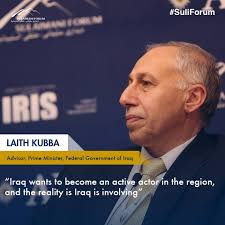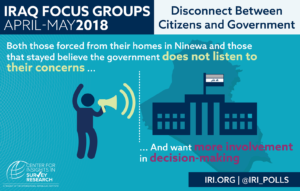Tens of thousands of Iraqis converged on Baghdad to rally against the presence of U.S. military in the country amid a surge of anti-American sentiment unleashed by the targeted killing of an Iranian general on their soil, The Wall Street Journal reports (HT:FDD). The crowds responded to demands for an end to the U.S. presence (HT:CFR/CNN) by prominent Shiite cleric Muqtada al-Sadr.
These startling developments stem from the ongoing disruption of the Qods Force control system in Iraq, says Washington Institute analyst Michael Knights. Indeed, the January 3 assassination of Soleimani and Muhandis has created a fleeting opportunity for Iraqi nationalists to seize the political reins back from the militias and restore Iraqi sovereignty.

Laith Kubba, a former advisor to Abdul-Mahdi, said the unprecedented protests have made it impossible for Iraqi politics to return to the status quo, in which corruption is rampant and government ministries are divided between parties along sectarian and ethnic lines. He warns that those who are attacking protesters are a threat to the entire country, NPR reports.
“It reminds me of the early days when Saddam Hussein and the Baath Party came to power and they started building a repressive machine,” says Kubba, a former MENA director at the National Endowment for Democracy (NED). “If it’s not halted now, it will become a monster.”
Iraq is not an Islamic state like Iran and it should free itself from the “corrupt, deviant, and criminal terrorist group” that controls it, said former Iraqi MP Mithal Al-Alusi (below), referring to the IRGC, MEMRI reports. Quds Force commander General Qasem Soleimani had been a killer, a thief, a gangster, and a terrorist, and the government should forcibly take control of all the weapons in Iraq.
But experts say Iran can be counted on to try to seize what it sees as an opportunity to push its agenda in Iraq, despite an ongoing mass uprising that is targeting government corruption as well as Iranian influence in the country, AP reports.
 “Iran is unconstrained by considerations of Iraqi sovereignty, domestic public opinion, or legality when compared to the Western democracies,” said David Des Roches, an expert with The Arab Gulf States Institute in Washington. “This is Iran’s strategic advantage; they should be expected to press it.”
“Iran is unconstrained by considerations of Iraqi sovereignty, domestic public opinion, or legality when compared to the Western democracies,” said David Des Roches, an expert with The Arab Gulf States Institute in Washington. “This is Iran’s strategic advantage; they should be expected to press it.”
In Iraq Needs a New Prime Minister, an article for the Fikra Forum, Iraqi academic Haitham Numan examines the still fragile domestic Iraqi politics in the wake of the recent escalation between Iran and the United States, noting how, in the wake of Prime Minister Abdul Mahdi’s resignation and the subsequent decisions of the caretaker government, continued protests are likely to shape Iraqi politics in the coming months.







